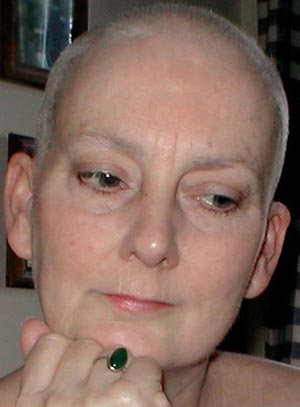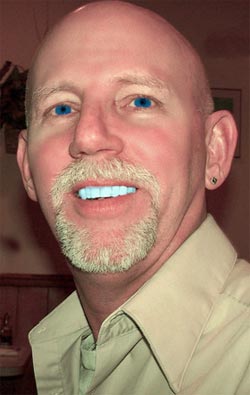
Reverse Hair Loss and Regrow Hair
www.whatcausesbaldness.net is written or edited by health professionals



|
Reverse Hair Loss and Regrow Hair www.whatcausesbaldness.net is written or edited by health professionals |


|
|
DISCLAIMERS ETC
Hi, I'm Donald, and I'm the new owner of WhatCausesBaldness .net I hope you like the changes that are being introduced and all the new information on baldness and hairloss. Copyright © 2000-present Donald Urquhart. Thank you for visiting. |
What Causes Baldness and Hair Loss?The genetics causes of baldness and hair lossIt isn't so much that most of us have a gene that causes baldness and hair loss, but that our hormones change with age, and this then causes the hair loss and baldness to happen. This hormone change may be genetically caused, but you don't have a gene that says," right, time to cause baldness, lets get rid of this hair".
The cause of baldness and hair loss has mainly shifted from genetics to hormonesTemporary loss of hair is caused by stress, medicines, vitamins, or hormonal changes, while the permanent loss of hair is caused by a hereditary condition called Androgenetic alopecia, or by damage occuring to the hair follicle and or scalp. However, the modern day view, is that what was often thought to be genetic causes of baldness and hair loss, are now often considered to be hormonal - and when the cause of hair loss or baldness is hormonal, it becomes treatable. Our perception of baldness and hair loss is therefore changing, as our understanding grows. For many of us, hair loss and baldness are no longer inevitable outcomes of aging. Science has extended our knowledge of baldness and hair loss incredibly so, and now, even if we are becoming bald, or are bald, or have lost much of our hair, we can now do something about it. In many cases we can stop the hair loss, and even regrow our hair Education and understanding of what causes baldness is our best defense against continued hair loss and against baldness, and also helps no end in regrowing lost hair.
The effects / symptoms of baldness, alopecia and hair loss are different in males and femalesIn males, the hairline recedes from the front, leaving only a small amount at the back by the end. In females the hair thins all over the scalp, beginning around age 30 and becoming more noticeable during or after menopause. Hair loss and baldness are not considered health problems, but for some individuals, it has disturbing emotional and psychological effects. Receding hair lines also change the appearance of the face, by shifting the centre appearance of the face upward toward the forehead.
The things that cause baldness, alopecia, hairloss(and How TREATABLE each type of baldness is)Baldness, which is medically known as alopecia, affects both sexes, male and female, and can be caused by any of the following:
The medical names for the types of baldness or hair lossAnagen Effluvium, or permanent hair loss, is caused by the loss of the follicles. One of the causes of baldness is the condition called as Telogen Effluvium, or a non-permanent loss of hair, is caused by the transitory damage of the hair follicles. Both the above forms of baldness and hair loss are extremely common in adults. Alopecia Areata is a baldness symptomised by the sudden loss of hair and normally leaves patchy areas of hair loss or baldness on the scalp.
Treatments for Baldness and Hair LossThe false hopeIt is important when considering any hair loss and baldness treatment, as to whether the baldness treatment actually works. There are many miraculous cures for baldness and hair loss backed by patient testimonials, but they just don't work in regrowing your hair. For example, you suffer Alopecia Areata. Your hair has just suddenly fallen out in big patches. What you don't know is that your hair will likely regrow - but you buy a hair regrower, your hair grows back, and you, being amazed, write a great testimonial, which then leads others to believe the cure you used will work. That's why testimonials are not the best proof for a baldness cure. You need the scientific evidence as well. To see what the scientific evidence is saying about hair replacement, please read our newer web site: Hair replacement choices.
The real hope for baldness cures and hair regrowth treatments.Most of the newer and better treatments for the causes of baldness and hair loss, work by altering the hormones affecting the hair follicles, so that new hair is stimulated to regrow from them. However, there is hope -- prescription and non-prescription medicines are becoming available in the fight against hair loss. While baldness may be uncomfortable, that doesn't mean that is has to be difficult to live through, and it is getting easier every day. Baldness, at least amongst men, is becoming a macho look, and treatments that work or help or prevent are becoming much more abundant. Even though medications to prevent hair loss and baldness are effective, there are alternatives, such as hair replacement surgeries and wigs, should all else fail. Wigs and toupees can be so skillfully made, that no one will be able to tell the difference - will not be able to see the hair loss or baldness.
Picture of happy gent courtesy of Netwolf56 / Picture of girls braided hair courtesy of Taliesin But first, if you want to come back to www.whatcausesbaldness.net again, just add it to your bookmarks or favorites now! Then you'll find it easy! Also, please consider sharing our helpful website on baldness and it's treatment with your online friends.
|